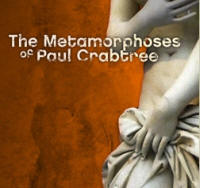 |
 |
Advertise | Sustaining Membership | VAN Store | Feedback
by Philipp Brieler for Vocal Area Network
Posted April 21, 2008
 When Cantori New York premiered Paul Crabtree's cantata An American Persephone in 2005, there
was instant chemistry between composer, conductor and singers. The success of
that concert led to a commission from the group and its Artistic Director Mark
Shapiro for another new work. Crabtree's Dive!
a Water Music has its world premiere on April 24 at St. Peter's Church at
Citigroup, as part of The Gregg Smith Singers Legacy festival. Persephone and
Dive! are again on the program of Cantori's last concert of the
season on May 17 at the Church of the Holy Trinity on the Upper East Side.
When Cantori New York premiered Paul Crabtree's cantata An American Persephone in 2005, there
was instant chemistry between composer, conductor and singers. The success of
that concert led to a commission from the group and its Artistic Director Mark
Shapiro for another new work. Crabtree's Dive!
a Water Music has its world premiere on April 24 at St. Peter's Church at
Citigroup, as part of The Gregg Smith Singers Legacy festival. Persephone and
Dive! are again on the program of Cantori's last concert of the
season on May 17 at the Church of the Holy Trinity on the Upper East Side.
"Paul is better than many at bringing current events to music," says Shapiro about the British-born composer who has been living in the U.S. since the 80s. "He has a gift for seeing connections between ancient stories and the way we live now on a very human and deep level." Both cantatas are based on texts from Ovid's Metamorphoses. Linking the writings of the Roman poet to 21st-century newspaper headlines, An American Persephone draws a parallel between the death of Rachel Corrie, an American student killed in Palestine in 2003, and the myth of Persephone, or Proserpina, the goddess of fertility who was abducted by Hades, lord of the underworld. Dive! tells the story of Hermaphroditus and the nymph Salmacis. Overcome by desire for the beautiful but innocent boy, Salmacis pursues him into a pool of water, where they fight and their bodies merge into one. Both tales lend themselves perfectly to musical treatment, especially by a composer who focuses on words. "Paul has a great ear for how things will sing," Shapiro explains. "His music is grounded in the tradition of the English madrigal, it has clarity and is very sensitive to the voice." In a conversation with Cantori member Philipp Brieler, Crabtree talks about the relationship between text and music in his works, the romantic side of Homer Simpson, and why it all started with a Genesis album.
PB: Almost all of your works use the human voice, many of them in a choral setting. What is it that fascinates you about vocal music?
PC: The setting of text adds another dimension, a certain layer of irony. The words can say one thing and the music can say another. There are so many layers of meaning that you can throw in that absolute music on its own doesn't necessarily have the ability to convey. Text gives you that incredible depth to do that. I have written just orchestral music, but even then I find that I'm reverting to quoting songs that the audience will know, so again they do have textual references. I think I'm drawn to text because it's just such an important way of communicating. I'm not quite sure if that's a strength or a weakness.
PB: Some of the texts you've used are pretty unusual.
PC: I set some words from The Simpsons, and it always takes people by surprise. There's a moment in one of the episodes where Homer has been thrown out of the house, and he's pleading with Marge to be let back in. And he has this most incredible sentence that nobody has ever heard, even though they've seen this episode. He says, "Marge, I need you, I need you more than anyone else on this entire planet could possibly ever need you. I need you to take care of me, I need you to put up with me, but most of all I need you to love me because I love you." I set this for eight-part chorus. It's very slowed-down, very pleading and romantic. It always makes people cry, and they can't believe this came out of the mouth of a cartoon character. "I need you to put up with me." How honest is that? It's so unexpected, so true to modern life. And that's what interests me. If you can just find the right words, the unexpected ones, you really have a very powerful artistic expression.
PB: In An American Persephone, you've set words by Ovid, Edna St. Vincent Millay and Rachel Corrie. How do these elements work together? What's the idea behind the piece?
PC: I think whenever I read the newspaper I'm subconsciously looking for musical ideas, for something relevant to make a composition from. The story of Rachel Corrie struck me as so tragic and wasteful, a life thrown away. She was a 23-year-old student protesting the destruction of housing in the Gaza strip. She had thrown her arms wide in front of a bulldozer, and the driver had either ignored or not seen her. He plowed over her and killed her. As soon as I read this I immediately remembered a passage from Ovid where the nymph Cyane tries to block the path of Hades as he is retreating with the abducted Persephone. She extends her arms in an effort to stop his chariot and foolishly lectures him on his duties. He stabs the bottom of her pool with his scepter and plunges the chariot into the underworld, and Cyane ultimately melts into "the very waters of which she had been the goddess." To me, the story had an uncanny similarity to the Rachel Corrie incident, like a repetition of history, and I realized it would make a wonderful little cantata. When I learned that Rachel Corrie's e-mails to her mother were available in the Guardian newspaper, I clipped a couple of sentences from there that would fit with the text. And there are two sonnets by Edna St. Vincent Millay, one about the persistence of loss, and one that deals with the overwhelming sadness of it all, the repetition of the cycles of history. That's how the piece came together. Trying to make a political statement wasn't my point. This is me opening a newspaper, seeing that Ovid was telling a story 2,000 years ago, and here's that same story.
PB: How did you come across the Hermaphroditus myth?
PC: I first got to know it through the music of Genesis. Before they became a pop group, they were part of the progressive rock of the early 1970s, and their album Nursery Cryme had a song called "The Fountain of Salmacis." When I grew up in central England, most of my friends were interested in rock music, but I also took private lessons with a fantastic music teacher who had taken me under her wing. I analyzed Beethoven sonatas and Schubert songs with her while I was in high school, and it was all completely fascinating to me. But at the same time, I was with this group of friends who were passionate about progressive rock. We would go out to concerts on a regular basis. It wasn't just entertainment to me, it was high art, as much as a Mozart opera. I was really in two worlds at once, and it was frustrating to me that the classical education I was getting refused to acknowledge the worth of all this rock music that was going on at the time. So today, part of my mission is to try to bridge the gap between the two cultures.
PB: What is the story of Dive! about?
PC: It's a power struggle. It's about the length people will go to to coerce other people to do things, even to the point of ruination. The character of Salmacis is just terrifying to me. She doesn't see Hermaphroditus as an individual at all, she just sees this kind of sexual object. And he cannot get away. I think she's an inexcusable rapist. There are various layers in the piece, and I'm hoping that it's going to be quite thrilling on the stage.
PB: As in Persephone, you've also included texts by other authors in addition to the Ovid.
PC: The Ovid translation I'm using is by Ted Hughes. It's more of a cross between an interpretation and a translation, and the opening paragraph has nothing to do with Ovid, so I had to find some other version of the beginning of the story. What the chorus sings is taken from somebody else's translation and from another book called The Water Babies, by Charles Kingsley. It's a Christian allegory, a morality tale that was a big hit in England in the 19th century. It's incredibly racist and politically incorrect, and luckily fell out of favor in the early 20th century, but the beginning suited my purposes. And the Ted Hughes is a fabulous text. It's so full of rich language, actually quite alarming and upsetting. Which is good. The soloist has some very dangerous lines. The battle scene, when they're fighting under the water, is so powerful. "'I've won. I've won!' shrieked Salmacis. He's mine!' She could not help herself." This is primal rapist talk, this idea of a battle that she's won. It's just horrible. It makes me squirm.
Tickets are available at www.cantorinewyork.com.
Philipp Brieler is a Managing Editor at the Metropolitan Opera and sings with Cantori.